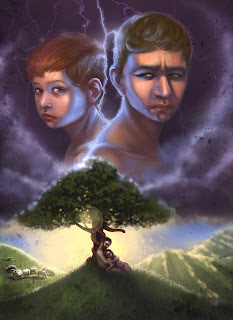 In continuing my second entry this year, January 2nd, 2013 I read Genesis 4 and 5.
In continuing my second entry this year, January 2nd, 2013 I read Genesis 4 and 5. Genesis 4 begins with the birth of Cain and Abel. Abel was a shepherd and Cain was a gardener. One day, Cain and Abel both offer sacrifices to God. Cain offered vegetables, and Abel offered an animal sacrifice. The Lord prefers Abel's sacrifice and rejects Cain's sacrifice.
God sees that he is angry and says "Why are you angry, and why has your countenance fallen? If you do well, will you not be accepted? And if you do not do well, sin is lurking at the door; its desire is for you, but you must master it."
Sin here is personified as a force that seeks to rule over mankind, and God tells us that it is our responsibility to know what is right from wrong, and to choose right from wrong. However, Cain is not able to do this, and since then all of humanity has followed the path of Cain.
Cain is unable to handle this kind of rejection, and becomes very angry. He tells his brother to come out to a field with him, and murders him in cold blood. When confronted by God, Cain asks "Am I my brother's keeper?"
I think that this phrase shows how Cain has rejected the importance of family. He speaks of his younger brother with contempt and lack of regard. He does not feel that he should be responsible for his brother's wherabouts. Of course he not only rejects his brother, but he murdered him.
God decides to make him a vagabond. Cain is cursed to always wander. He is sent to the land of Nod that is east of Eden. (Nod in Hebrew means wander.) God actually shows mercy as well. He says that if anyone kills Cain, God would repay his vengence seven times. I think that this may have interesting implications about capital punishment. The first murder in history was forgiven, and anybody who sought to avenge Abel would be punished. Perhaps this is the beginning of Jesus "turn the other cheek" teaching. Perhaps, like divorce, capital punishment was given because of the hardness of the heart's of humankind.
Chapter 5 in essense is a geneology. There are a few notable things though. The first is the obvious. Age. These people lived a very long time. Now, there are some Christians who take this literally, and there are other Christians who think that this is exagerated in order to Honor them, and others think that instead of 900 years, it should be translated 900 seasons. I am not sure at this point, and I do not think that it effects the reading of scripture.
Enoch is said to have walked with God, and God took him. Some believe that means that he died without sinning. Other's believe that means that Enoch did not die, but rather God took him in a similar way that he took Elijah.
There are also a couple of Poems scattered about. One is like an ancient lymerick about Lamech killing a young boy for bruising him, and boasting "If Cain's vengence is 7 fold, then Lamech's is 77 fold. A real vain thing to brag about.
But the stage is set for the flood story. Lamech is Noah's Father. Lamech names his child Noah because he believes that Noah will bring rest to the world. Apparently things had gotten pretty bad. It seems that sin had thouroughly corrupted the world already. The first sin outside of the Garden was murder, and murder was becoming common. Such was not the case in the Garden of Eden.
you are invited to follow my blog
ReplyDeleteThis deal with protecting Cain really vexes me. I have had capital punishment so pounded into me by society that even if it is wrong, I almost feel that we must do our best financially; which would mean not paying for violent criminals to live good lives inside prison. People feel that either these people need to live good lives inside prison (not ethic or moral-wise, but living standards), or be taken out of the picture with capital punishment and empty our prisons and save ourselves the trouble and the money.
ReplyDeleteEither way, I feel as if the sanctity of life is so important. People like to brag about how they are pro-life, but sometimes the same people are very pro-death in a way and do not really understand and respect the sanctity of life. Many so called pro-lifers will say things like, "abortion is always wrong." But there are instances when pregnancy will not only kill the baby, but WILL also kill the mother (as in the case of tubal or Fallopian pregnancies). If we are pro-life, we should be pro-save-a-life. This is not about simply the baby, but the preservation of life in general. Save the mother.
I feel people also are confused on capital punishment. They want to say that they are pro-life, then want to put people to death.
Well, are you pro-life or not? People need to learn to be consistent.